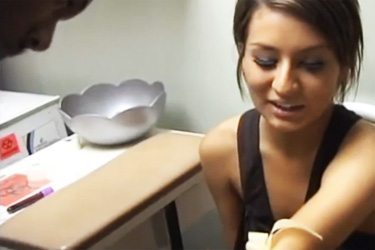Porn Stars Will Head Back to Work With New Rules and No Condom Law
Despite the recent HIV outbreak among porn stars, a bill to require condoms on set died in the California senate. So porn stars will head back to work on Friday without condoms, but with new STD testing rules.

The question of whether condoms should be mandatory on all porn sets has gotten a lot of attention in the last few weeks as a number of adult film stars have tested positive for HIV. Advocates have pointed to the outbreak as proof that the industry cannot monitor itself, while industry insiders have insisted that its actors are safe on set without any outside interference or mandates. This week, the industry came out ahead when a bill that would have required condoms on set died in committee and the industry announced that filming would start again on Friday under new rules to better police itself. Advocates, however, are not convinced that the new rules will be enough and vow that the bill will be introduced again in the next legislative session.
As Rewire has reported, the porn industry halted production in August when actress Cameron Bay announced she had tested positive for HIV. The moratorium was lifted when all her on-screen partners tested negative. Then, earlier this month, Rod Daily, a star of gay porn movies who was in a romantic relationship with Bay, announced he had also tested positive. Though his announcement did not trigger a pause in production, because he was not tested through official channels and was not on set, a third unnamed star also tested HIV-positive, forcing the cameras off again. (A fourth case also made news last week, though there are mixed reports as to whether this case has been confirmed.)
Activists took to the media to argue that porn actors are in danger on set and will not be safe until condoms are required. Last year, the activists, led by the AIDS Healthcare Foundation, got a measure on the ballot in Los Angeles County that would require actors in all permitted adult films to wear condoms. The Safer Sex in the Adult Film Industry Act, known as Measure B, was passed by an overwhelming majority of voters last year despite threats from producers that they would simply take their operations—and tax dollars—elsewhere. The measure has yet to be enforced, in part because of a legal challenge (that was settled in favor of Measure B in August) and in part because the county simply can’t quite figure out how to implement it.
This year, the AIDS Healthcare Foundation turned its attention to the statehouse in order to extend the measure statewide, and thwart producers who said they would just move their filming to other parts of the state. AB 640 was introduced by Assemblymember Isadore Hall III (D-Los Angeles) in March. It would have required the “provision of and required use of condoms and other protective barriers whenever acts of vaginal or anal intercourse are filmed,” as well as the provision of condom-safe lubricants to facilitate the use of condoms. The bill would have also required producers to pay for sexually transmitted disease (STD) testing, provide hepatitis B vaccines free-of-charge to all actors, and create a written health and safety plan. Interestingly, though condoms are required to be worn, the bill specifically notes that the bill “shall not be construed to require condoms, barriers, or other personal protective equipment to be visible in the final product of an adult film.”
The bill died in the Senate Rules Committee as the legislative session came to an end, the Los Angeles Daily News reported Friday night. Though it is not clear exactly what happened at the closed-door meeting, the AIDS Healthcare Foundation has accused Assemblyman Mike Gatto (D-Los Angeles), who publicly opposed the bill, of putting a hold on it and not letting the bill out of the committee. The organization called Gatto “a pornographer’s best friend.” Gatto scoffed at this and said he did not have nearly as much power as was attributed to him. In a statement to LA Weekly, he said, “It’s clear that AHF is trying to bully the legislature into spending taxpayer money, and that they don’t understand the legislative process. I would expect that Isadore Hall would explain to them that AB 640 is not before me, it’s before the Senate. There are two houses of government, and I don’t have a vote in the Senate, let alone control it.”
The industry, on the other hand, gave credit for its victory to a coalition of supporters. Diane Duke—CEO of the Free Speech Coalition, the trade organization that monitors STDs on set—said in a statement, “A number of people put forth a great deal of effort, to make sure this bill would not see the light of day. From our coalition partners to the performers and countless industry members who showed up in Sacramento to protest, we owe you all a debt of gratitude. This was truly a team effort, thank you.”
She added, “Thankfully, science won over scare tactics. Three performers did test positive for HIV in the past month, but none of them contracted it on an adult set. Politicians tried to use concern about HIV to push through a mandate opposed by both performers and producers.”
On Monday, Duke’s organization announced new rules for monitoring STDs on set. The new rules will require STD testing every 14 days, rather than every 28 days. Though this may help detect certain STDs sooner, the rule may not have had an impact on the current HIV outbreak, as it can take up to eight weeks post-infection for HIV to be detectable. Duke also noted that her organization needed to do a better job of helping performers learn how to protect themselves on and off set.
